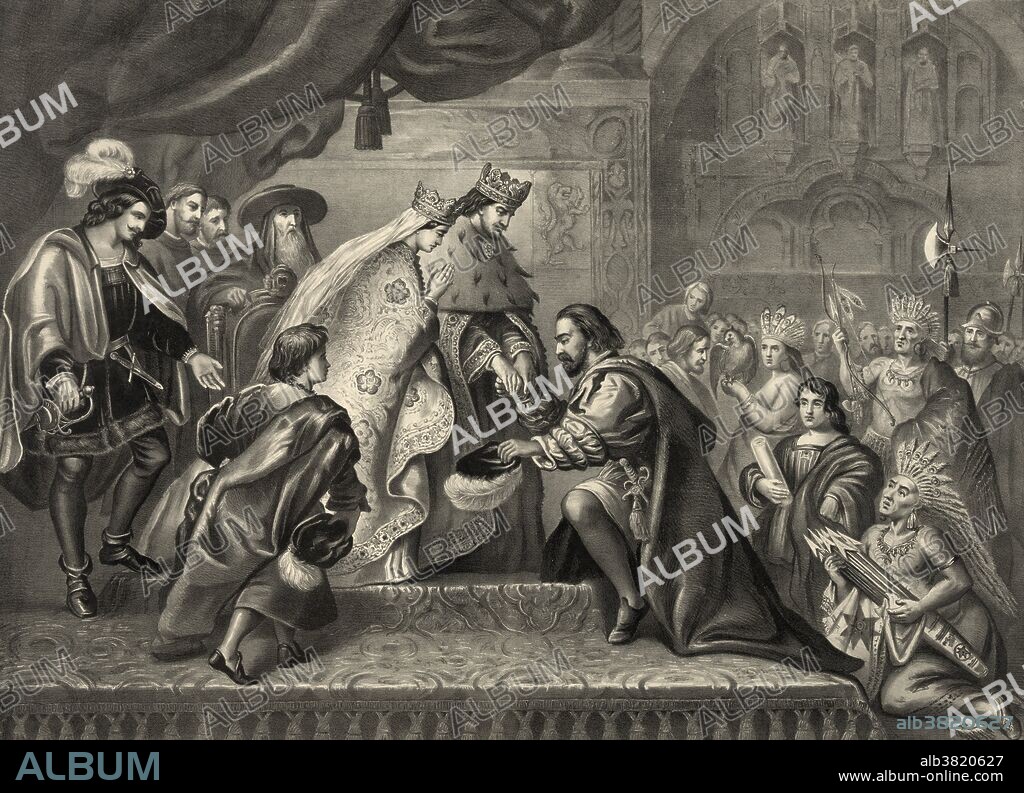alb3820627
Columbus Received by Ferdinand and Isabella

|
Zu einem anderen Lightbox hinzufügen |
|
Zu einem anderen Lightbox hinzufügen |



Haben Sie bereits ein Konto? Anmelden
Sie haben kein Konto? Registrieren
Dieses Bild kaufen.
Nutzung auswählen:

Titel:
Columbus Received by Ferdinand and Isabella
Untertitel:
Siehe automatische Übersetzung
Lithograph entitled: "Columbus reception by the King Ferdinand and Queen Isabella of Spain after his first return from America." Christopher Columbus (October 30 or 31, 1451 - May 20, 1506) was an Italian explorer, colonizer, and navigator. He completed four voyages across the Atlantic Ocean that led to European awareness of the American continents. During his first voyage in 1492, instead of reaching Japan, he landed in the Bahamas archipelago, which he named San Salvador. Over the course of three more voyages, he visited the Greater and Lesser Antilles, the Caribbean coast of Colombia and Venezuela, claiming them for the Spanish Empire. His efforts to establish permanent settlements in the island of Hispaniola, started Spanish colonization, which foreshadowed the general European colonization of the "New World". Though Columbus was not the first European explorer to reach the Americas, his voyages led to the first lasting European contact with the Americas, inaugurating a period of European exploration, conquest, and colonization that lasted for several centuries.
Bildnachweis:
Album / Science Source / Library of Congress
Freigaben (Releases):
Model: Nein - Eigentum: Nein
Rechtefragen?
Rechtefragen?
Bildgröße:
5100 x 3684 px | 53.8 MB
Druckgröße:
43.2 x 31.2 cm | 17.0 x 12.3 in (300 dpi)
Schlüsselwörter:
AMERIKANER • BERÜHMT • BERÜHMTE PERSÖNLICHKEIT • ENTDECKER • ERKUNDUNG • EUROPAEER (F M) • EUROPAEER • EUROPÄER (F M) • EUROPÄER • EUROPÄISCH • FORSCHER • ILLUSTRATION • ILLUSTRATIONS • KATHOLIK • KATHOLISCH • MANN • NAVIGATION • NAVIGATOR • NOTABEL • PERSON • PERSöNLICHKEITEN • PERSÖNLICHKEITEN • PROMINENZ • SPANIEN • WISSENSCHAFT: ENTDECKER • WISSENSCHAFT: FORSCHER
 Pinterest
Pinterest Twitter
Twitter Facebook
Facebook Link kopieren
Link kopieren Email
Email
